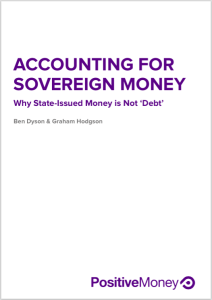New Report: Why State-Issued Money is Not Debt


Positive Money advocates a shift away from the current ‘debt-based’ monetary system, in which almost all money is created by commercial banks when they make loans, to a ‘sovereign money’ system in which only the central bank is able to issue new money. In the past, we’ve described sovereign money as ‘debt-free money’, because it is spent into the economy without any household or firm taking on further debt.
This triggered an ongoing debate about the use of the term ‘debt-free money’. Randall Wray argues (here and here) that all money is a form of debt, regardless of whether it’s issued by banks when they issue loans, or by the government when they spend. His reasoning is that (a) the money is recorded as a liability on the balance sheet of the issuer, and (b) if it wasn’t a debt, it would have no value. Eric Lonergan and Norbert Haring have engaged in the debate with some very insightful points.
This type of debate always runs the risk of descending into semantics. To try to find a definite answer on the subject, we’ve been looking at the official guidelines followed by accountants around the world to see whether sovereign money should be recorded as a debt.
What we found is that according to the International Accounting Standards, sovereign money cannot be considered a debt of the state. But if sovereign money is not the debt of the state, then what is it? It turns out that sovereign money conforms to the classification of equity.
In the 10-page briefing, we explain:
What the International Accounting Standards say about debt, liabilities and equity
Why bank notes are currently recorded as liabilities of the state
Why the fact that the state currently accepts sovereign money as payment for taxes does not mean that sovereign money is a form of debt. (Hint: It’s a throwback to the gold standard era that ended over 80 years ago.)
If sovereign money is equity, what is it equity in?
The fact that sovereign money is not debt is important for two reasons.
Firstly, issuing sovereign money does not simply mean that, as Randall Wray claims, we are replacing one form of ‘debt money’ with another form of debt-based money. There is a significant difference between money issued as debt by commercial banks, and sovereign money issued by the state.
Secondly, there is a significant difference between issuing sovereign money and sovereign debt (government bonds). Sovereign debt obliges the state to deliver a stream of interest payments over the lifetime of a bond, plus the obligation to deliver cash (sovereign money) when the bond matures. In contrast, sovereign money imposes no such obligations upon the state. So issuing sovereign money is not simply another form of deficit spending, as some economists have argued.
Download the full briefing here